Deep within an encyclopedic review of lesser-known candidates running for Oregon governor, Salem news website Oregon Capital Chronicle makes a startling discovery: One of the entrants in the Republican primary faces federal assault charges stemming from the failed insurrection at the U.S. Capitol.
Reed Christensen, 63, filed paperwork to run for governor Jan. 7—one year and one day after federal prosecutors say he struck a Capitol Police officer with his fists as rioters attempted to overturn the presidential election.
WW reported in April that Christensen, a retired Intel electrical engineer living in Hillsboro, faces charges that he forcibly assaulted, resisted, impeded or interfered with law enforcement, and willfully and knowingly engaged in an act of physical violence on the grounds of the Capitol Building on Jan. 6, 2021.
That makes him one of a handful of Oregonians charged in the Jan. 6 attack, along with two Baptist missionary brothers and a Moldova-born conservative Instagram influencer. He’s also part of what Politico identified as a trend of Republican candidates who were in Washington, D.C., that day seeking to install President Donald Trump for a second term.
But few of those office-seekers participated in the storming of the Capitol or face federal charges.
Reached by phone on Saturday evening, Christensen told WW that he takes pride in his actions that day.
“I think Jan. 6 was an appropriate reaction by the American people,” he said. “I think it was the first time since maybe even the Civil War when Republicans didn’t just wave signs at a rally, but really had a protest.
“That’s what I did,” he continued. “I did a protest. I tried to cross the line of control to wave a flag from the Capitol steps. When I came back from the Jan. 6 rally, I felt like I had participated in the Boston Tea Party 2.0. If anything, I have more of a right to run as governor because I stood up for the Constitution.”
A criminal affidavit filed April 14 by FBI agent Byron J. Speakes described Christensen’s actions differently.
“At 2:20 p.m., Christensen first tried to forcefully remove the bike rack barriers,” Speakes writes, referring to metal gates that kept rioters from advancing toward the Capitol. “At that time, a Metropolitan Police Department (”MPD”) Officer deployed a chemical irritant (‘OC spray’) in the face of Christensen in order to repel the barrier removal.
“Despite receiving a directed stream of OC spray to his face, Christensen forcefully pushed against the bike rack barriers, and against both USCP and MPD Officers,” the affidavit continues. “Christensen then breached the bike-rack perimeter of the Lower West Terrace.” Capitol police then gave Christensen a bottle of water to wash the pepper spray out of his eyes.
Three minutes later, Speakes writes, “Christensen charged through the perimeter and struck Officer Chapman. Christensen then pushed against the body of a USCP Officer, and delivered fist strikes to a second USCP Officer.”
Christensen has made the events of that day a central element of his campaign materials, contending that he is standing up to a tyrannical government. He told WW in tonight’s interview that COVID-19 pandemic stay-home and mask orders were government overreach that logically resulted from vote-by-mail elections that he believes were fraudulent.
“Will the leftists that control this state at least hold a one-day, open election and convince me that the majority of people want this?” he asked. “Why would I lose my rights as American as the result of a closed election where I have to believe that not one county cheated? Why don’t you convince me with an open and honest election?”
Christensen says that he and his wife will spend the next 10 months traveling Oregon in an RV to talk with voters. The next hearing in his federal assault case is March 23.

